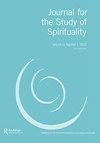Supporting spiritual health in dementia using the WELLHEAD Toolkit: A ‘story-tale’ from a person with logopenic aphasia
IF 0.8
0 RELIGION
引用次数: 1
Abstract
ABSTRACT Little is known about the spirituality of people with logopenic aphasia (language-led dementia), including assessment and support. This article presents a single case study from a case series of ten people with various aphasia-types and different religious backgrounds who were recruited after discharge from speech and language therapy (SLT). Based on work with ‘Mr Grey’, it illustrates the use of the ‘WELLHEAD Toolkit’ for assessing and supporting spiritual health. A group of people with aphasia and diverse backgrounds co-produced the resources and steered the research. The Toolkit provides communication support and structure for eliciting interviews about ‘meaning and purpose’ in life. It enables religiously neutral non-judgmental listening and facilitates reflection using Picture and Word Resources, incorporating self-scores, an agreed summary, and goal-setting. Sessions were videoed along with a feedback interview. Participants’ reflections, measures, and verification were integral to the findings from the case series. Findings were analysed via systematic interpretive thematic analysis, verified by an independent researcher. Key themes in Mr Grey’s case are presented in narrative form to respect his own words, interpreted and verified for meaning, within his search for synthesis of his fragmented story. His story-telling brought him catharsis concerning relationships, religious beliefs and sense of self, whilst helping him to frame future goals. Follow-up confirmed the value of enabling chaplaincy referral as a result of the interviews. This helped him towards resolving historical grief before further language deterioration. Limitations and potential future applications of the WELLHEAD Toolkit are discussed.使用WELLHEAD工具包支持痴呆症患者的精神健康:一位失语症患者的“故事”
对于语词缺失性失语症(语言导致的痴呆)患者的精神状况,包括评估和支持,我们知之甚少。这篇文章介绍了一个单独的案例研究,这个案例是由十个不同失语症类型和不同宗教背景的人组成的,他们都是在言语和语言治疗(SLT)出院后被招募的。基于与“格雷先生”的工作,它说明了使用“井头工具包”来评估和支持精神健康。一群不同背景的失语症患者共同提供了资源并指导了这项研究。该工具包提供了沟通支持和结构,以引出关于生活中的“意义和目的”的访谈。它使宗教中立的非判断性的倾听和促进反思使用图片和文字资源,结合自我评分,一个商定的总结,和目标设定。会议与反馈访谈一起被录了下来。参与者的反思、测量和验证是案例系列研究结果的组成部分。研究结果通过系统的解释性专题分析进行分析,并由独立研究人员进行验证。在格雷先生的案例中,关键主题以叙事的形式呈现,尊重他自己的话语,在他寻求对支离破碎的故事的综合的过程中,对其意义进行解释和验证。他的故事给他带来了关于人际关系、宗教信仰和自我意识的宣泄,同时帮助他制定了未来的目标。访谈的结果证实了牧师转介的价值。这有助于他在语言进一步退化之前化解历史的悲痛。讨论了WELLHEAD Toolkit的局限性和潜在的未来应用。
本文章由计算机程序翻译,如有差异,请以英文原文为准。
求助全文
约1分钟内获得全文
求助全文
来源期刊

Journal for the Study of Spirituality
RELIGION-
CiteScore
2.50
自引率
7.10%
发文量
25
期刊介绍:
Journal for the Study of Spirituality is a peer-reviewed journal which creates a unique interdisciplinary, inter-professional and cross-cultural forum where researchers, scholars and others engaged in the study and practices of spirituality can share and debate the research, knowledge, wisdom and insight associated with spirituality and contemporary spirituality studies. The British Association for the Study of Spirituality (BASS) organises a biennial international conference and welcomes enquiries about membership from those interested in the study of spirituality in the UK and worldwide. The journal is concerned with what spirituality means, and how it is expressed, in individuals’ lives and communities and in professional practice settings; and with the impact and implications of spirituality in, and on, social policy, organizational practices and personal and professional development. The journal recognises that spirituality and spiritual values can be expressed and studied in secular contexts, including in scientific and professional practice settings, as well as within faith and wisdom traditions. Thus, Journal for the Study of Spirituality particularly welcomes contributions that: identify new agendas for research into spirituality within and across subject disciplines and professions; explore different epistemological and methodological approaches to the study of spirituality; introduce comparative perspectives and insights drawn from different cultures and/or professional practice settings; aim to apply and develop sustained reflection, investigation and critique in relation to spirituality and spiritual practices; critically examine the values and presuppositions underpinning different forms of spirituality and spiritual practices; incorporate different forms of writing and expressions of spirituality.
 求助内容:
求助内容: 应助结果提醒方式:
应助结果提醒方式:


